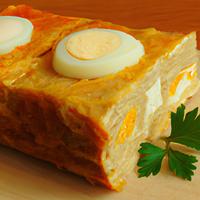
1 serving (100 grams) contains 150 calories, 10.0 grams of protein, 12.0 grams of fat, and 2.0 grams of carbohydrates.

Log this food in SnapCalorie

Nutrition Information
Calories |
357.1 | ||
|---|---|---|---|
% Daily Value* |
|||
| Total Fat | 28.6 g | 36% | |
| Saturated Fat | 11.9 g | 59% | |
| Polyunsaturated Fat | 0 g | ||
| Cholesterol | 476.2 mg | 158% | |
| Sodium | 714.3 mg | 31% | |
| Total Carbohydrates | 4.8 g | 1% | |
| Dietary Fiber | 0 g | 0% | |
| Sugars | 2.4 g | ||
| protein | 23.8 g | 47% | |
| Vitamin D | 119.0 mcg | 595% | |
| Calcium | 119.0 mg | 9% | |
| Iron | 2.4 mg | 13% | |
| Potassium | 238.1 mg | 5% | |
* Percent Daily Values are based on a 2,000 calorie diet. Your daily values may be higher or lower depending on your calorie needs.
Food Attributes
Source of Calories
About Eierstich
Eierstich is a traditional German egg garnish often featured in soups, such as clear broths or consommés. It is made from a simple mixture of eggs, milk or cream, and a pinch of salt, sometimes lightly seasoned with nutmeg or parsley. The mixture is strained for smoothness, poured into a mold, and cooked gently in a water bath until firm. Once set, it is sliced or diced into decorative shapes for serving. Eierstich is high in protein, thanks to its egg content, and provides essential nutrients like Vitamin D and choline. However, its use of cream or whole milk can contribute to higher levels of saturated fat, making portion control important for a balanced diet. Due to its minimal ingredients, Eierstich is a versatile and elegant addition to soups while offering a moderate nutritional profile. It reflects the simplicity and precision of German cooking traditions.



